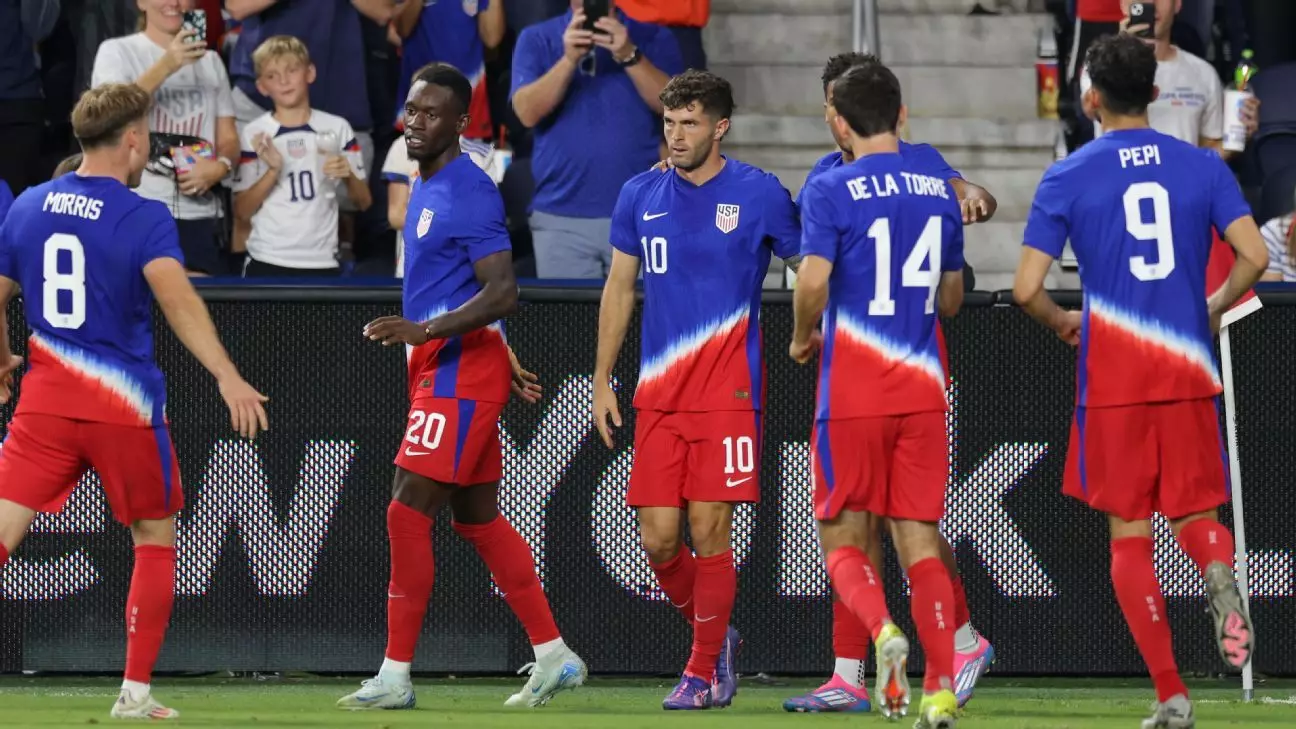The recent friendly match against New Zealand left a bitter taste in the mouths of U.S. soccer players, particularly for star forward Christian Pulisic. In the dying moments of the game, a defensive blunder resulted in a last-minute equalizer, sealing a 1-1 tie. This disappointing outcome unveiled the significant challenges that lie ahead for newly appointed head coach Mauricio Pochettino, who takes the reins at a critical time for American soccer. Despite the frustrations, Pulisic emphasized the importance of optimism, stating that “better days are ahead.”
The match occurred just after the announcement of Pochettino’s hiring, highlighting a transitional phase for the U.S. Men’s National Team (USMNT) and the pressing demands for improvement in various aspects of play and mentality. Pulisic’s call to action—“time to turn the page”—suggests a desire for a collective reset for a team that has struggled in its recent performances.
Pulisic’s frustrations were compounded by the broader context of the team’s struggles. Mikey Varas, serving as interim head coach, faced the daunting task of leading a squad still reeling from the termination of Gregg Berhalter. Following a disappointing elimination from the Copa América, expectations were already low. Adding to the frustration was a recent loss to Canada—the country’s first defeat to its northern rival on home soil in over six decades. Such outcomes reflect a concerning trend, as the U.S. has now gone winless in their last four matches, including consecutive home games—a feat not seen since the 2010-11 season.
Pulisic, however, managed to break through by scoring, frustratingly stepping over the line from being a victim of the team’s collective morass to becoming a vital contributor once again. The match showcased his classic skill set, weaving through defenders and displaying finesse in his shot—both critical for a take-charge mentality reverberating through the squad. Nevertheless, his expressions of discontent after the final whistle pointed to a deeper-seated collective frustration.
The announcement of Mauricio Pochettino’s hiring arrived with a wave of excitement mixed with apprehension. His reputation for nurturing talent and instilling discipline is well-documented, and many are hopeful that he can restore a winning mentality within the group. Interestingly, Varas expressed pride in what has been accomplished under interim leadership, signaling that there is a foundation for growth though the transition has been rocky.
Pulisic expressed high expectations for Pochettino’s influence, wishing for a cultural shift that encourages resilience and boldness among team members. The wide-ranging woes of American soccer at the international level necessitate a re-evaluation of team culture—a hard-hitting issue that the new coach must address swiftly. Pulisic firmly believes this change in mindset, coupled with Pochettino’s strategic acumen, can foster a positive transformation for USMNT.
Another critical consideration in the U.S. soccer landscape is the onboarding of players who have experienced varied levels of competition. Pulisic’s excellent performance signifies an encouraging trend of young talents stepping up, but it also exposes a chasm in team cohesion that Pochettino must mend. The match against New Zealand also featured players making their debuts, highlighting ongoing player development but iterating that national and club level experiences will be pivotal for the USMNT’s success.
The fact that, for the seventh time in eight matches, no Major League Soccer (MLS) players started raises questions about the league’s role in fostering local talent that can bolster the national team’s chances. Only 8 of 209 available starting positions were awarded to MLS players post-2022 World Cup, presenting a large discrepancy that underlines the growing pains within American soccer. This reality further compels Pochettino to emphasize a robust system of player development, testing new strategies to ensure that local players find their way to the national squad.
As the USMNT gears up for future exhibitions, the focus will shift toward crafting a cohesive unit ready to compete at elevated levels. With games against Panama and Mexico on the horizon, anticipation builds. Pulisic’s insights into the necessary cultural shifts may serve as the roadmap for Pochettino’s new strategy.
The blend of frustration, hope, and necessity punctuates this period for the U.S. national soccer team. As Pochettino steps forward, the challenge will be not only to strategize effectively but also to cultivate a resilient ethos among the players—one grounded in the potential for growth and a collective commitment to excellence. Such foundational shifts may be essential to reclaiming the U.S. team’s place among soccer elite as they look toward the 2026 World Cup.


Leave a Reply